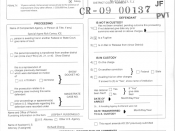Criminal identity theft occurs when a person gives another person's name and personal information such as a drivers' license, date of birth, or Social Security number to a police officer during an investigation or an arrest. Or the imposter may present to law enforcement a counterfeit license containing another person's data. Sometimes the imposter has a driver's license or identification card in the victim's name. Or the imposter uses the name of a friend or relative, without showing identification. In many cases, the imposter is cited for a traffic violation or for a misdemeanor violation and is released from the arrest. The imposter promises to appear in court. If the imposter does not appear in court, the judge may issue a bench warrant, but the warrant of arrest will be under the victim's name. The identity theft victim may not know there is a warrant of arrest issued under the victim's name.
The victim may unexpectedly be detained to a routine traffic stop and then subsequently arrested and taken to county jail because of the outstanding bench warrant. In some cases the imposter will appear in court for the traffic or misdemeanor violation and plead guilty without the victim being aware of this event. In other cases, the imposter is arrested and booked at the county jail for a felony such as a drunk driving or other serious public offense. The imposter provides the victim's name and personal information. This information is then recorded in the countywide database and is usually transferred to the State's criminal records database. Some identity theft victims, unaware of the earlier criminal activity by the imposter, may learn of the impersonation when the victim is denied employment or terminated from employment. In these cases, the employer conducted a background investigation and had relied...
![Arrest note [Surachai Sae Dan arrested]](https://s.writework.com/uploads/14/140562/arrest-note-surachai-sae-dan-arrested-thumb.jpg)

